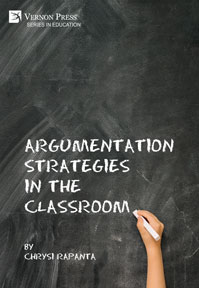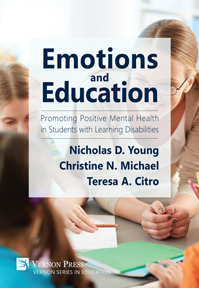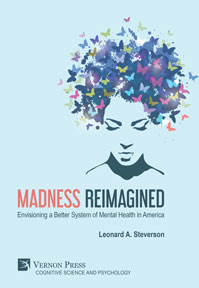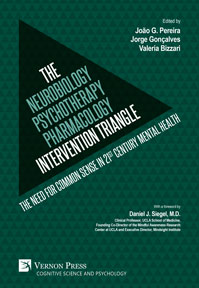Creating Compassionate Classrooms: Understanding the Continuum of Disabilities and Effective Educational Interventions
by Nicholas D. Young (American International College), Angela C. Fain (University of West Georgia, USA), Teresa A. Citro (Learning Disabilities Worldwide), Kara Johnson (Endicott College), Michaela F. Rice (Endicott College), Elizabeth J. Bienia (Endicott College, Beverly, MA), Katherine B. Green (University of West Georgia), Jessica L. Bucholz (Sarasota County Public Schools, FL), Janet I. Goodman (Haralson Public Schools, GA), James R. Schwab (University of West Georgia), Jennifer M. Innocenti (American International College), Kristen L. Bonanno-Sotiropoulos (Bay Path University), Michelle A. Gremp (Eastern Kentucky University), Ann Marie Leonard-Zabel (ABSNP, Curry College and NEALAC Clinic), Rachel L. Seaman-Tullis (University of West Georgia), John M. Schaefer (Cleveland State University)
Purchase this book
(click here to change currency)
Creating Compassionate Classrooms: Understanding the Continuum of Disabilities and Effective Educational Interventions is a must have book that offers a comprehensive look at the thirteen disability areas under IDEA. In order to ensure the reader has a comprehensive understanding of special education, the first chapters examine IEPs and RtI, while subsequent chapters give in-depth descriptions of each disability category and the necessary accommodations and modifications to ensure student success. Readers will truly appreciate the candor and clarity this book provides and will find themselves referring to it often in their own practice.
Martha H. von Mering, Ph.D.
Administrator of Special Services and Student Support Services
Westfield Public Schools, Westfield, MA
It is rare to find a book so complete that it answers all your questions about special education, yet, Creating Compassionate Classrooms: Understanding the Continuum of Disabilities and Effective Educational Interventions does just that. The authors begin with an explanation of special education, response to intervention, and the creation and meaning of individualized education plans. Attention is then placed on describing each disability area according to the Individuals with Disabilities Act and providing student modifications and accommodations as well as practices and strategies that will enhance educator best practices. The importance of providing just-right educational settings for students while simultaneously supporting teachers in their quest to educate them cannot be ignored.
Vinnie Regan, MS, MEd
Principal
Springfield Public Schools, Springfield, MA
Compassionate Classrooms: fills an especially important gap in the prevailing special education literature. This book is one of those few sources that thoroughly examines all thirteen recognized student disability classifications while, simultaneously, presenting best practices in educational interventions for each. For this reason, every special education educator, administrator and parent should consider this one a must read and maintain a copy on their bookshelf for future reference. Those who work with students with disabilities understand that this landscape is complex—this book helps help make it all that much more understandable.
Judith L. Klimkiewicz, Ed.D.
Senior Consultant for K-12 College/Career Education and Workforce Development
Commissioner's Office
Massachusetts Department of Elementary and Secondary Education
Superintendent of Schools, retired, Nashoba Valley Technical School District, MA
Throughout the chapters of this book, the reader will be introduced to the thirteen disability categories included in IDEA (specific learning disabilities, emotional/behavioral disorders, autism, other health impaired, intellectually disabled, multiple disabilities, speech or language impairments, traumatic brain injury, hearing impairment, deaf/blind, deafness, visual impairment, and orthopedic impairment), using the legally established definitions. Lengthy descriptions of best practices, modifications and accommodations follow, offering a complete picture of each disability and how educators and parents collaboratively can assist the struggling student.
To set the stage, the book begins with chapters that discuss special education in general, response to intervention as an intermediary step in the academic continuum of support, and the individualized education plan process. Subsequent chapters examine each of the thirteen aforementioned IDEA disability categories, which have not been commonly incorporated into one comprehensive resource; however, for the sake of brevity, some disability categories have been combined when doing so did not impact practice implications. Emphasis is placed on effective classroom strategies and interventions associated with each disability category with the intent of providing practitioners and those who support them with the information and tools necessary to support students with identified educational needs. To the extent possible, the primary authors sought to ensure this resource was practical and user-friendly for educators who work directly with students with the range of recognized disabilities.
This book demystifies the special education process and disability categories as well as offers educators and their families the tools to help our students, who have one or more disabilities, find life-long success. Ensuring the best for our students with disabilities requires that we first acknowledge and support the hard work and deep commitment of those professionals and parents/guardians who devote their lives to teaching, reaching, mentoring and advocating for those most vulnerable in our classrooms.
Acknowledgement
Preface
1. Introduction to Special Education
Angela C. Fain, PhD, University of West Georgia
2. The Potency of the Response to Intervention Framework
Nicholas D. Young, PhD, EdD, American International College
Kara Johnson, Med, Endicott College
3. Creating Meaningful and Measurable Individualized Educational Plans
Nicholas D. Young, American International College
Michaela Ross, MEd, Endicott College
4. Emotional Disturbance
Angela C. Fain, PhD, University of West Georgia
5. Autism Spectrum Disorder
Nicholas D. Young, PhD, EdD, American International College
Elizabeth Jean, EdD, Endicott College
6. Speech and Language Impairments
Katherine B. Green, PhD, University of West Georgia
7. Intellectual Disability
Jessica L. Bucholz, EdD, University of West Georgia
Janet I. Goodman, EdD, Georgia Southern University
8. Specific Learning Disabilities
James R. Schwab, PhD, University of West Georgia
Angela C. Fain, PhD, University of West Georgia
9. Other Health Impairments with an Emphasis on ADHD
Nicholas D. Young, PhD, EdD, American International College
Jennifer Innocenti, MA, American International College
Kristen Bonanno-Sotiropoulos, EdD, Bay Path University
10. Deaf and Hard of Hearing
Michelle Gremp, PhD, Eastern Kentucky University
11. Visual Impairment and Deaf-Blindness
Nicholas D. Young, PhD, EdD, American International College
Kara Johnson, MEd, Endicott College
12. Traumatic Brain Injury
Ann Marie Zabel, EdD, Curry College
13. Multiple Disabilities
Rachel L. Tullis, PhD, University of West Georgia
John M. Schaefer, Ph.D., Cleveland State University
About the Authors
Dr. Nicholas D. Young has worked in diverse educational roles for more than 30 years, serving as a principal, special education director, graduate professor, graduate program director, graduate dean, and longtime superintendent of schools. He was named the Massachusetts Superintendent of the Year; and he completed a distinguished Fulbright program focused on the Japanese educational system through the collegiate level. Dr. Young is the recipient of numerous other honors and recognitions including the General Douglas MacArthur Award for distinguished civilian and military leadership and the Vice Admiral John T. Hayward Award for exemplary scholarship. He holds several graduate degrees including a PhD in educational administration and an EdD in educational psychology. Dr. Young has written extensively in the fields of education, counseling, and psychology.
Dr. Angela C. Fain has worked in the field of special education for the past 20 years. She received her Ph.D. and M.Ed. in special education at Georgia State University, as well a B.S. in Therapeutic Recreation. She earned national certification as a Nationally Certified Therapeutic Recreation Specialist (TRS). Dr. Fain has worked in some of the most restrictive educational environments that students with disabilities are served, as a both a TRS and special education teacher. She is now an assistant professor at the University of West Georgia. Dr. Fain is a regular presenter at state, national, and international conferences and she is an active board member of Learning Disabilities Worldwide. She has authored several book chapters and articles on various topics in special education ranging from classroom management to successful academic interventions for students with disabilities.
Dr. Teresa Allissa Citro is the Chief Executive Officer, Learning Disabilities Worldwide, Inc. and the Founder and President of Thread of Hope, Inc., She is a graduate of Tufts New England Medical School and Northeastern University, Boston. Dr. Citro has co-edited several books on a wide range of topics in special education and she co-authored a popular children’s series I Am Full of Possibilities. She is the co-editor of two peer review journals including Learning Disabilities: A Contemporary Journal and Insights on Learning Disabilities from Prevailing Theories to Validated Practices.
Special education, Individuals with Disabilities Act, specific learning disabilities, emotional/behavioral disorders, autism, other health impaired, intellectually disabled, multiple disabilities, speech or language impairments, traumatic brain injury, hearing impairment, deaf/blind, deafness, visual impairment, orthopedic impairment, best practice, research-based interventions, individualized education plan
See also
Bibliographic Information
Book Title
Creating Compassionate Classrooms: Understanding the Continuum of Disabilities and Effective Educational Interventions
ISBN
978-1-62273-604-1
Edition
1st
Number of pages
192
Physical size
236mm x 160mm

![Creating Compassionate Classrooms: Understanding the Continuum of Disabilities and Effective Educational Interventions [Hardback]](/file/7598/ea566503e03349c94ff1525888c5d7a6/1545125352.jpg)







